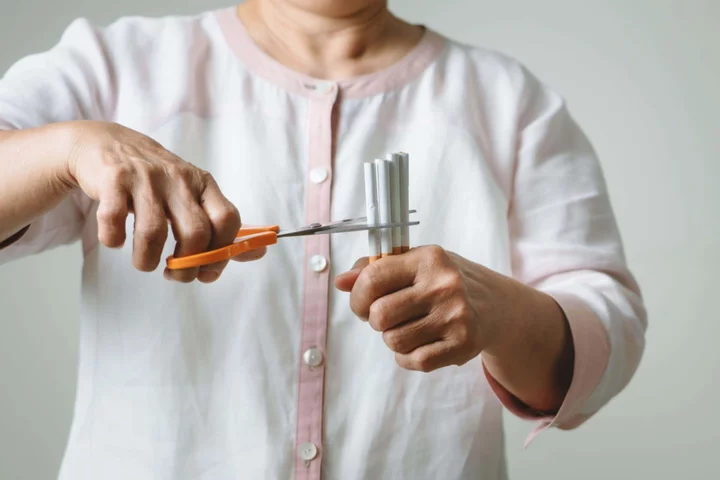
How quitting smoking can boost your health and finances – as Government considers adding messages to cigarette packs
Messages encouraging smokers to quit could be added to cigarette packs. A draft proposal with the suggestion is being considered by the Government. According to the Department of Health, these inserts will highlight the financial and health benefits of giving up smoking and the support available to those trying to quit. The Department of Health hopes the inserts – which have already been used in other countries including Canada and Israel, with Australia also planning to introduce them – could lead to an additional 30,000 smokers giving up, saving up to £1.6 billion in health costs. Smoking is still one of the most preventable causes of illness and death in the UK, with around 76,000 people dying from it every year, according to NHS figures. The consultation launched on Monday and will be running until October. In the meantime, it’s always a good time to try and stop smoking, and focusing on the positive outcomes can help you stay on track too. Here are some of the financial and health benefits of quitting smoking… More disposable income Smoking costs around £17.3 billion a year across England overall, according to the latest 2023 economic data analysis commissioned by public health charity Action on Smoking and Health (ASH). This includes a significant cost to the NHS and social care, with smoking-related admissions and primary treatments reportedly costing £1.9 billion yearly. However, quitting smoking could make a significant difference to people’s individual pockets too – a major incentive to beat the habit. Especially right now, with the cost of living so high. According to Everyone Health, if you get through 20 cigarettes a day, with a packet of cigarettes costing £13.30, that’s a spend of £93.10 per week, or £4,841.20 per year. The average smoker may smoke a bit less than that per day, but this could still add up to serious money. “The average smoker can save around £38 a week by quitting smoking, that’s £2,000 a year, according to the NHS,” said Abbas Kanani, a pharmacist at Chemist Click. What could you do for yourself and your family with that extra money? Better mental and physical healthThe good news is, evidence suggests quitting at any point in life leads to big improvements in your health, including increased life expectancy and lower disease risk. “Stopping smoking is one of the best things you will ever do for your health,” said Kanani. “Quitting smoking improves your physical health, and boosts your mental health and wellbeing after as little as six weeks of being smoke-free. Every time you smoke a cigarette, your body is flooded with thousands of chemicals, many of which are poisonous. “The day you stop, your body starts clearing itself of all those nasty toxins and the repair process begins. People who have quit also have increased positive mood compared with people who continue to smoke,” Kanani added: “Longer-term risks of cancer, lung disease, heart disease and stroke will be significantly reduced too. You will also be less likely to develop type 2 diabetes, bone disease including osteoporosis, eye disease and dementia.” Improved blood circulation “The blood circulation to your heart and muscles can improve, which will make physical activity easier and improve lung function, which leads to reductions in any cough, wheezing or other breathing problems,” continued Kanani. All of this will have a knock-on effect on how energised you feel day-to-day, as well as contributing to better general health in the short and long term. Improved sense of taste and smell Being able to taste and smell food better is another huge bonus to quitting smoking. George Sandhu, deputy superintendent pharmacist at Well Pharmacy, said: “There are a number of almost immediate benefits to stopping smoking, including healthier teeth and gums, fresher breath, and improved sense of taste and smell. In the longer term, you’ll probably find your breathing will improve, and ultimately you’ll probably end up living a longer, healthier life.” Protecting your loved ones from second-hand smoke Second-hand smoking or ‘passive smoking’ is dangerous too. According to the NHS, most of the smoke from a cigarette goes into the air around you and not your lungs – therefore it’s those around you or nearby that will breath it in. And as the World Health Organisation (WHO) highlights, tobacco kills more than 8 million people each year, including 1.3 million non-smokers who are exposed to second-hand smoke. “Quitting means you’ll protect your loved ones from the potential health harms of second-hand smoke too,” said Kanani. If you would like support to help you quit smoking, talk to your GP or local pharmacist. Read More Charity boss speaks out over ‘traumatic’ encounter with royal aide Ukraine war’s heaviest fight rages in east - follow live Is it ever safe to sunbathe? A beginner’s guide to pickling your homegrown fruit and veg Mother tried to cure son of disease by putting him in a hole as a child
2023-08-14 20:20
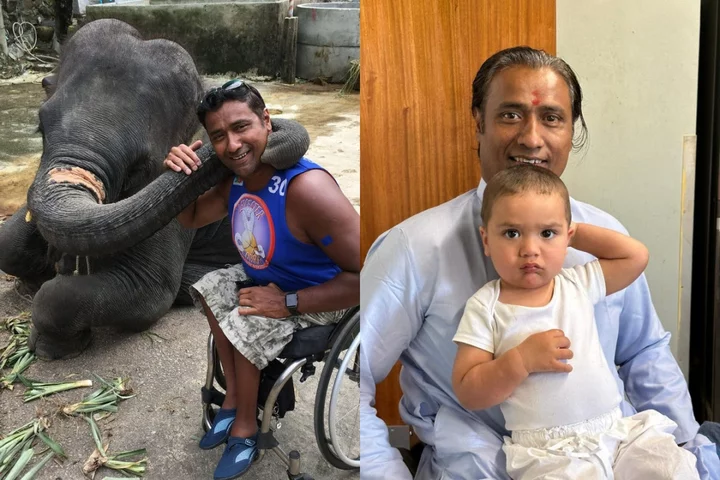
Paraplegic man with polio whose mother tried to cure him by putting him in a hole as a child now flourishing in the UK
A paraplegic man with polio who spent hours of his childhood in a hole in the ground in Mumbai, as his mother believed blood flow to his legs may cure the disease, and was “carried everywhere” until the age of 14, has said “you should never give up” as he defied the odds to become a professional wheelchair sportsman and father a child in his 50s. Jignesh (Jig) Vaidya, 52, who was born in Mumbai, India, but now lives in Leicester, contracted polio aged two as he was not “vaccinated at the right time” because his family could not afford it. This resulted in him being paralysed from the waist down, and he was hospitalised for at least six months at the age of four, with his legs in plaster to keep them straight. After this, Jignesh’s doctor said “there’s nothing we can do”, and since his family could not afford a wheelchair or further treatment, and his access to education was limited due to his disability, he remained at home for several years, with his mother Nirmala, now 83, “doing everything for him” – washing, feeding, changing and carrying him. Defying his difficult beginnings, Jignesh has spent his life moving across the world, becoming a professional wheelchair basketball player and enjoying a successful career, currently working as a project assistant at Maximus UK and broadcast assistant at the BBC, all before the birth of his now 20-month-old son, Jesse. He has not forgotten where his life began, however, and told PA Real Life: “As an Indian remedy, (my mother) dug a hole outside our house in the sun and put my whole body in it for six hours every day, neck down, in 30-degree heat. “She put really heavy bangles on both my legs and asked me to sit on the wall for three, four hours a day, dangling them, as she thought, ‘Jignesh will walk one day’.” Jignesh said his mother believed in Indian medication and thought the blood flow may help to cure his polio – a serious infection caused by a virus – but Jignesh described it as “hell”. From that point on, he thought, “this is going to be my life, this is it for me, it’s not going to get any better”. “I thought, ‘I’m going to be a loser – I hate to say that word – I’m not going to have any friends, and I’m going to be asking people for help all my life’,” he added. At the age of 14, Jignesh was given a wheelchair after his community rallied to raise some funds and he was finally able to go to school. He said he had to “catch up to the people who were ahead of (him)”, but he loved having some independence and no longer having to be carried by his family or others. He experienced a major setback when he moved to Dubai at 16, as he gave up his wheelchair to support another young boy with polio in Mumbai, and this left him in a dark place, mentally, as he had no “freedom”. Since then, however, he has moved to Leicester, received an “amazing education”, competed as a professional wheelchair basketball player, skydived, and fathered a son called Jesse, despite doctors saying this would not be possible. Jignesh said: “You should never give up in this life, and don’t be afraid to open up and ask for help. “Do what you’re best at and, if you work at something every day, whatever your goal is in life, you will get there. “It may take some time, maybe even years – it took me until the age of 20 to learn how to write my name in English – but I didn’t give up and look at me now.” From the age of 14, when Jignesh received his first wheelchair in Mumbai, he said he started to “flourish” and enjoyed going to school. However, he was subjected to discriminatory comments by his teachers, with one saying: “He’s handicapped, he can’t go at the front, put him in the back.” Since Jignesh’s late father Laxmikant, 66, was working in Dubai at the time, he ended up moving out there for two years at the age of 16 – but because his family could not afford to send him to school and he no longer had his wheelchair, he said he spent two years “looking out the window, watching people go by”. He said “there was nothing for (him)”, apart from a taxi ride once a month, and this significantly impacted his mental health, as he felt this had reversed all the progress he had made. “There was one point in my life, in those two years, where I was going to dark places and crying all the time,” he said. “I thought, ‘If mum’s not here, I could jump out the window and nobody will know. I can end it’, because I thought, ‘This is it, I can’t go back to what I had, I’m stuck’.” After his father earned enough money from those two years in Dubai, he and his family moved to the UK in 1988, when he was 18, and this is when everything changed. He received a new wheelchair in March 1989, aged 19, and started full-time education in September 1990, aged 20, where he learned English, maths, and how to use computers – and given he had impressive upper body strength and speed, he started playing sports as well, including wheelchair hockey and basketball. “I was a coloured person, a new arrival, couldn’t speak the language, and yet I was treated like everyone else,” he said. “I just thought, ‘Wow, I’m a part of society, I’m not being treated like a dog, like I was in Mumbai’, and if an opportunity comes in, I will take it, as there’s no going back. “When I started playing sports, I knew there and then that this is it, this is my life, this is my path.” Jignesh has since gone on to compete as a professional wheelchair basketball player internationally in places such as France, play for teams including MK Aces Wheelchair Basketball Club and Leicester Cobras, coach at the Coventry Crusaders club, skydive, and father Jesse with his partner Julie, 40, a teacher – confounding doctors. He goes to his local Nuffield Health gym every day, completing workouts and classes which have been adapted for him, and this helps to slow the progression of his polio as muscle weakness can increase over time. He “cherishes” being able to work with the “amazing” staff, including his personal trainer Matthew Molloy, in an inclusive environment where he is part of a team, supported, and everyone can “flourish”. Looking back, Jignesh realises why his mother, who he now cares for, would say, “everything happens for a reason”, and he is extremely grateful for his family’s love and support. He is excited to watch Jesse grow up, and he wants to continue encouraging disabled people to stay active, fight for their rights, and “never give up”. “I never thought that when I was in that hole, or when I was in Dubai and had nothing, that I’d be where I am today,” he said. “Sometimes, when I’m driving, I think, ‘This could be a movie; I’m going to wake up and be back in Mumbai’, so every day now, I pray and say, ‘Thank you’.” To find out more about Nuffield Health, visit: nuffieldhealth.com Read More Trypophobia: ‘Mushrooms, Beanie Babies and Doja Cat - I lived in fear for 30 years’ Lucozade addict drinks eight bottles a day and says it’s harder to quit than class-A drugs Charity boss speaks out over ‘traumatic’ encounter with royal aide Ukraine war’s heaviest fight rages in east - follow live
2023-08-14 19:29

Is it ever safe to sunbathe?
Summer holidays are in full swing – and it’s very hot in Europe. Returning with a sun-kissed glow is always a bonus, but is lounging around on sunbeds ever truly safe? “As UV rays from the sun reach our skin, they stimulate the production of melanin, a pigment responsible for giving our skin its colour. Melanin acts as a natural defence mechanism, as it absorbs UV radiation and helps protect the skin from damage,” says Dr Tim Clayton, consultant dermatologist at Pall Mall Medical in Manchester. “Increased melanin production leads to tanning of the skin, which is the body’s way of trying to shield itself from further UV exposure.” So, if we are sunbathing to tan, our skin is always defending itself. Is it OK to sunbathe for a short amount of time? The longer you’re exposed to the sun, the worse the impact and damage may be. “Excessive and unprotected sun exposure, especially with frequent sunburns, increases the likelihood of developing skin cancer, including basal cell carcinoma, squamous cell carcinoma, and melanoma,” says Clayton. Even if a tan develops without any visible signs of sunburn over a shorter period of time, the DNA in your skin cells can still be damaged, notes Clayton. “The DNA damage caused by UV radiation increases the risk of skin cancer, including the most dangerous form, melanoma.” What about SPF? “Sunbathing, even with the use of sunscreen, still carries some risks. While sunscreen can provide some level of protection, it is not foolproof, and other factors should be taken into consideration,” he explains. While sunscreen can help reduce the amount of UV radiation that penetrates the skin, it does not completely block it. “Some UV radiation can still reach the skin, increasing the risk of DNA damage, premature ageing, and skin cancer.” A lot of the time, the protection we use does not actually work as it should. “Sunscreens are designed to reduce the amount of UV radiation that reaches the skin, but they are not perfect barriers. Factors such as inadequate application, insufficient SPF, and not reapplying sunscreen regularly can compromise its effectiveness. Additionally, some areas of the body, like the eyes and lips, may not be adequately protected by sunscreen alone,” Clayton continues. Equally, we may expose ourselves to too much sun, because we think it will be safe. “Wearing sunscreen may give a false sense of security, leading individuals to stay in the sun for longer periods, or neglect other sun-safe practices, such as seeking shade or wearing protective clothing. Sunscreen should be used as part of a comprehensive sun protection strategy, rather than relying on it as the sole means of protection.” We are not always the best at applying it, either. Sunscreen application requires proper technique and thorough coverage to be effective. Many of us don’t apply enough sunscreen, miss certain areas, or fail to reapply it when needed. “These application errors can reduce the sunscreen’s effectiveness and leave the skin vulnerable to UV damage,” he says. Is a tan always bad for my skin? However much you may want to look bronzed, it is not safe. “While a tan is often seen as a desirable aesthetic for some individuals, it is important to understand that any change in skin colour, due to sun exposure, indicates damage to the skin.” How can I get a tan instead? A fake tan may have to be the answer if you want to protect your skin and get a glow. As Clayton says: “Self-tanning products or spray tans can provide a safer alternative to achieve a tanned appearance without subjecting the skin to harmful UV radiation.” Read More Charity boss speaks out over ‘traumatic’ encounter with royal aide Ukraine war’s heaviest fight rages in east - follow live A beginner’s guide to pickling your homegrown fruit and veg Messages urging smokers to quit could be placed inside cigarette packs King and Queen ‘utterly horrified’ by Hawaii wildfires in letter to Joe Biden
2023-08-14 15:51
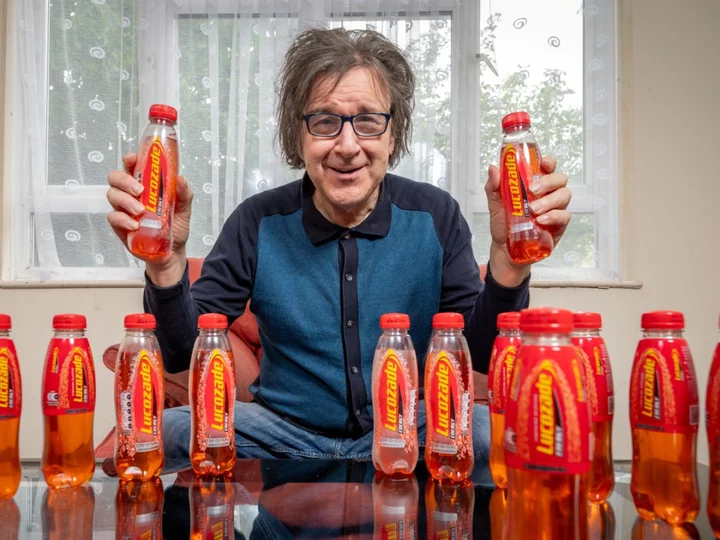
Lucozade addict drinks eight bottles a day and says it’s harder to quit than class-A drugs
A grandfather is addicted to Lucozade despite having three heart attacks, and said it's harder to give up than class-A drugs. Garry Johnson, 65, began drinking coffee aged 12 and loved the caffeine buzz. The now-retired painter and decorator took cocaine and amphetamines in his teens, and after 15 years of on-off drug use went “cold turkey” when his son Sam was born in 1992. Keen to stay energised, he took up drinking 380ml bottle bottles of Lucozade Original, and now gets through eight a day. He's had the habit for 29 YEARS and it currently costs him around £150 a month. And at today's prices, his nearly three decade habit would have cost him more than £42,800. He had three heart attacks between 2012 and 2014 because of a hereditary heart condition, and doctors encouraged him to ditch caffeinated drinks. He gave up dairy and every other form of caffeine - but he still necks more than three litres of Lucozade a day. He said Lucozade is proving harder to give up than class-A drugs - because of the "after effect - like that lovely feeling in your mouth after you eat an expensive bit of chocolate." Garry, from Basildon, Essex, said: "I took cocaine every day but it was a piece of cake to give up - but I'd find it really hard to ever give up Lucozade. "I love it - not just the taste but the affect on my body makes me feel great. If I do go two or three hours without one, I fancy one... God knows how I'd be after two days.” He stopped using cocaine aged 30, when his son Sam, now 31, was born and went cold turkey because being a new dad was "stimulant enough". He started drinking Red Bull but found himself with migraines, and eventually moved onto Lucozade. He initially drank six a day, but has had eight a day for the last seven years. Now he goes to Tesco every day and buys one or two four-packs - depending how many bottles he already has stacked up in the fridge ready to drink. "I've always needed some kind of stimulant and eventually I realised Lucozade is perfect for me," he said. "After my heart attacks they told me to quit the energy drinks but I recently had new heart tests and my results are better than they've ever been. "I guess I've just found one that suits my body." But Garry said he doesn't even want to give up because it's a "part of his identity" - like a person's favourite shirt or their daily breakfast. He justifies the cost because he doesn't drink alcohol or smoke. He said: "£5 a day - that's less than a pint of beer today in some places." If you or someone you know is suffering from alcohol addiction, you can confidentially call the national alcohol helpline Drinkline on 0300 123 1110 or visit the NHS website here for information about the programmes available to you. If you or someone you know is suffering from drug addiction, you can seek confidential help and support 24-7 from Frank, by calling 0300 123 6600, texting 82111, sending an email or visiting their website here. SWNS Read More What I gained (and lost) by walking 10,000 steps each day for 5 months Husband ‘ruins’ dinner because of his wife’s typo: ‘The worst kind of control freak’ John Whaite says he ‘spent time apart’ from fiancé after ‘falling in love’ with Strictly pro
2023-08-14 14:45

Strictly’s Amy Dowden shares pictures of new wig amid chemotherapy treatment for breast cancer
Amy Dowden has shared an update after announcing she has breast cancer. The dancer told fans that she underwent a single mastectomy to treat stage three breast cancer after she was first diagnosed in May. But last month, she was told she needed chemotherapy after further tumours were discovered following the surgery. Since receiving her diagnosis, Dowden, who is best known for working as a professional dancer on BBC’s Strictly Come Dancing since 2017, has been raising awareness of breast cancer and updating her followers throughout her treatment. In her latest update, Dowden shared a series of posts to her Instagram Stories showing her followers the bespoke wig she had made as undergoes chemotherapy. Both Dowden and the owner of Be Unique Wigs by Charlotte shared a screenshot of their messages, as Dowden thanked her for making the wig. Charlotte, the wigmaker, wrote: “I’ve been working on a wig for the beautiful @amy_dowden and just received this lovely message from her! “I love her,” wrote Dowden in the messages, asking if she could order another one. “Thank you so so so very much.” The wigmaker said in an Instagram post that it was an ‘honour” to make the wig for the Strictly professional. “I’m hoping it will give you some comfort in a difficult time, I’ve said many times on here... it’s not just hair!” said the wigmaker. “Losing your hair can make such a difference to your confidence it’s almost like losing part of your identity,” Charlotte added. Last month, in an Instagram Live conversation for the charity CoppaFeel!, Dowden spoke about being told she’d need chemotherapy after more tumours were discovered following her mastectomy. “For me my journey everything changed,” she explained. “I was originally going to have a lumpectomy, radiotherapy and hormone treatment. But then, after my MRI, they found another tumour so then it changed into a mastectomy and then, after my mastectomy, unfortunately, they found even more tumours. “They found another type of cancer and then they told me I needed chemo – for me that was a massive blow,” she continued. “It wasn’t in the plan, originally – and I know the plan you can’t get fixated on.” Dowden also added that would not be able to dance in a competitive capacity on this year’s Strictly. “This year, it means I’m not going to be able to dance with a celebrity on Strictly, but I’m in such regular contact with the team – the BBC have just been utterly incredible,” she said. “The rest of the year looked very different to what was planned but hopefully I’ll enter 2024 cancer free and I’ll never take anything for granted and promise to live life to the full,” she wrote in a post last month. Dowden joined Strictly in 2017, and has competed in every series since, reaching the final in 2019 with kids’ TV presenter Karim Zeroual. Find the full Strictly Come Dancing 2023 lineup here. Read More What I gained (and lost) by walking 10,000 steps each day for 5 months Pink fan who went into labour during concert names newborn son after pop star Woman behind viral ‘not real’ plane tirade says her life has been ‘blown up’ Strictly’s Amy Dowden shares health update following second cancer diagnosis How to sleep during hot weather, according to experts What is rheumatoid arthritis?
2023-08-13 18:25
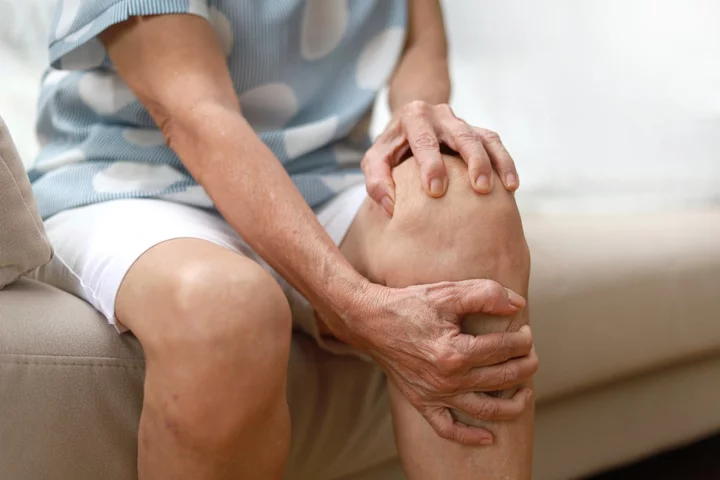
What is rheumatoid arthritis?
Waterloo Road star Adam Thomas has announced he has rheumatoid arthritis ahead of his Strictly Come Dancing debut next month. In an Instagram post shared on 11 August, the actor, 35, told his followers that he initially thought that the condition was something people were diagnosed with “later on in life”. “As much as I act like a kid, my body is telling another story…” he wrote. “I thought that was something people, later on in their life get… but that’s not the case, clearly!” “I’ve been in a lot of pain since January,” he continued. “It started with my knees and then travelled to my wrists, fingers and now ankles and toes.” Thomas explained: “I never knew what was happening and finally after several blood tests and back and forth to doctors and hospitals, I’ve been diagnosed with rheumatoid arthritis!” The actor, who is competing in this year’s instalment of Strictly Come Dancing but has said that he is “up for the challenge”. “It really couldn’t have come at a better time I’m a firm believer of everything happening for a reason, and I know the journey I’ve been on was meant to happen, to never take small things in life for granted!” he assured fans. “…Like going for a run, playing with my kids and just being able to walk with no pain!” “I know it’s going to be tough and I’ve definitely got my work cut out but am up for the challenge and can not wait to get on that dance floor!!” What is rheumatoid arthritis? Rheumatoid arthritis is an autoimmune disease and long-term condition that typically affects the hands, feet and wrists. Benjamin Ellis, a Consultant Rheumatologist and Senior Clinical Policy Advisor to Versus Arthritis (the UK’s largest arthritis charity), told The Independent: “Rheumatoid arthritis affects people of all ages, and happens when the immune system – the body’s natural defence system – goes out of balance and attacks the joints making them inflamed, swollen and painful.” Some people with rheumatoid arthritis also experience problems in other parts of the body, or more general symptoms such as tiredness and weight loss. According to the NHS, the condition often starts when a person is between 30 and 50, and women are more likely to be affected than men. What causes rheumatoid arthritis? The NHS states that it is not clear what triggers this problem with the immune system, but women, people who smoke, and people who have a family history of rheumatoid arthritis are at increased risk. Depending on how much pain a person experiences, their daily tasks can become difficult and take longer to do. Is there a cure for rheumatoid arthritis? There is no cure for rheumatoid arthritis but an early diagnosis and treatment allows people with the condition to have long periods between flare-ups. The NHS states that the main treatment options include taking medicine to relieve symptoms, supportive treatments like physiotherapy and surgery to correct any joint problems. Ellis told The Independent that early treatment can reduce the risk of long-term joint damage. “Urgent and intensive treatments to rebalance the immune system improve symptoms and reduce the risk of long-term, disabling joint damage caused by this inflammation, but NHS delays mean that not everyone is getting the treatment they need, as quickly as they need it,” said Ellis. “Keeping moving is great for the joints, whatever type of arthritis you have. The best thing is to pick something you enjoy, and listen to your body to do the right amount that works for you, whether that’s walking, yoga, swimming or dancing.” What are the complications of rheumatoid arthritis? Having rheumatoid arthritis can sometimes lead to other conditions like carpal tunnel syndrome or inflammation of other areas of the body, causing additional symptoms. The NHS states that some complications can be more serious, like an increased risk of heart attack and stroke. But it advises that managing the condition early on can help to reduce the risk of complications. You can find out more about living with Rheumatoid arthritis on the NHS website here. For further support and information about arthritis, visit www.versusarthritis.org or call the free Versus Arthritis helpline on 0800 5200 520 . Read More Adam Thomas diagnosed with long-term health condition ahead of Strictly Come Dancing Husband ‘ruins’ dinner because of his wife’s typo: ‘The worst kind of control freak’ Fan who went into labour at Pink concert names newborn son after her Adam Thomas diagnosed with long-term health condition ahead of Strictly Come Dancing From Angela Scanlon to Zara McDermott: The fashion of this year’s Strictly contestants Linda Evangelista opens up about co-parenting with son’s stepmother Salma Hayek
2023-08-12 19:49

Adam Thomas diagnosed with long-term health condition ahead of Strictly Come Dancing
Actor Adam Thomas has revealed he has been diagnosed with a long-term health condition just days after being announced as the eighth celebrity contestant who will compete in the forthcoming series of Strictly Come Dancing. Sharing a post to Instagram on Friday (11 August) to celebrate his 35 birthday, the Waterloo Road actor told his followers that he has been diagnosed with rheumatoid arthritis. “As much as I act like a kid, my body is telling another story…” he wrote. “I’ve been in a lot of pain since January,” he continued. “It started with my knees and then travelled to my wrists, fingers and now ankles and toes.” Thomas explained: “I never knew what was happening and finally after several blood tests and back and forth to doctors and hospitals, I’ve been diagnosed with rheumatoid Arthritis!” The actor, who is best known for playing Donte Charles in BBC school-based drama, said that he originally thought arthritis was something that people are diagnosed with “later on in life”. Last week, Thomas was announced as the eighth celebrity contestant to appear on Strictly Come Dancing, but has said that he is “up for the challenge”. “The reason I signed up to Strictly is because I just want to be able to move again, get fit and do it, all with a smile on my face!” he wrote. “It really couldn’t have come at a better time I’m a firm believer of everything happening for a reason, and I know the journey I’ve been on was meant to happen, to never take small things in life for granted! …Like going for a run, playing with my kids and just being able to walk with no pain!” “I know it’s going to be tough and I’ve definitely got my work cut out but am up for the challenge and can not wait to get on that dance floor!!” Thomas, who marked his birthday by sharing a picture with his wife, Caroline Daly and their two children, told his followers to “stay positive” and “get the right help where and when you can”. Rheumatoid arthritis is an autoimmune disease and long-term condition that causes pain, swelling and stiffness in the joints. The condition usually affects the hands, feet and wrists and can cause flare-up periods, where symptoms become worse for a period of time. According to the NHS, the condition often stars when a person is between 30 and 50 years old, and women are more likely to be affected than men. Thomas played Adam Barton in ITV soap Emmerdale and also appeared in I’m a Celebrity... Get Me Out of Here in 2016, and went on to co-host the spin-off I’m a Celebrity: Extra Camp. Speaking in a statement ahead of his Strictly debut, Thomas said he has been a fan of the dance competition “for years”. “I can’t believe I’m actually doing it!” he said. “I can’t dance to save my life but I’m buzzing to learn and have a good laugh with my pro. Get me on that dance floor... I can’t wait!" Former Strictly contestants have been sharing their words of encouragement for Thomas as he embarks on the challenging training schedule. “You’re so strong and with your family behind you, you can conquer anything. Can’t wait to see you smash it on Strictly ,” wrote singer and presenter Fleur East, who competed in last year’s competition. TV presenter Angela Scanlon, who will be competing alongside Thomas this year, wrote: “You’ve got this.” Find the full Strictly Come Dancing 2023 lineup here. Read More Husband ‘ruins’ dinner because of his wife’s typo: ‘The worst kind of control freak’ Fan who went into labour at Pink concert names newborn son after her From Angela Scanlon to Zara McDermott: The fashion of this year’s Strictly contestants Linda Evangelista opens up about co-parenting with son’s stepmother Salma Hayek Katharine McPhee reveals she and David Foster suffered a ‘family tragedy’
2023-08-12 17:51

Linda Evangelista makes rare comment about co-parenting with son’s stepmother Salma Hayek
Linda Evangelista has made a rare comment about co-parenting with her son Augustin’s stepmother, Salma Hayek. The 58-year-old model spoke candidly about her relationship with her ex, François-Henri Pinault, and his wife, Hayek, during a recent interview with Vogue while appearing on the cover of the magazine’s September issue. She revealed that, during the holidays, her 16-year-old son is usually with his father and stepmother, who share a 15-year-old daughter, Valentina. However, according to Evangelista, there was one holiday celebration where she hadn’t felt well, so Hayek stepped in to take care of her. “I was sick at Thanksgiving,” she explained. “And Salma got on the plane with her daughter, came here, and made Thanksgiving dinner. She asked what I wanted - it was a very eclectic wish list.” She continued: “I wanted her Mexican chicken with truffled potatoes. And she spent the day in the kitchen and cooked it herself. No help. The kids helped her at the end.” She went on to praise Hayek for quickly coming to her aid immediately after she’d said that she was sick. “She made a feast - a beautiful, beautiful meal. I had told her that I wasn’t going to have Thanksgiving; I wasn’t feeling well. And she said: ‘Oh yes you are: I am coming.’ And poof, she was here,’” the model added. In 2011, Evangelista filed court papers to seek child support from Pinault, with the document revealing that he was the father of her son. While the pair had dated for three to four months in 2006, Pinault said that he’d only spent about seven days total with the model. They settled the child support case in 2012. It appears that Evangelista’s son and Hayek have gotten close over the years. In 2021, Hayek took to Instagram to share a rare snap of her and Augustin on a boat during what appeared to be a family vacation. Augustin also made his red carpet debut in April, alongside Hayek and Valentina, as they attended the Time 100 Gala together. Elsewhere in her interview with Vogue, Evangelista opened up about raising her son while in the spotlight. She recalled how, during the early days of her career, Madison Square Garden would call and offer her courtside seats to Knicks games, which she’d go to with her son. However, according to Evangelista, now that those calls have “stopped,” she and her son buy the tickets themselves. “Out of sight, out of mind. Now we buy our tickets and we sit with the fans in nosebleed - we’re fine with that. I wanted to have a very normal upbringing for my child,” she said. Evangelista also said that her son has questioned the benefits of fame, as he’s asked: “Do you think if they recognised you we would have to be standing in this line?” However, she said that she doesn’t hesitate to counter the question, before explaining that she doesn’t want her child to grow up being “entitled”. “What’s wrong with standing in this line? I stand in lines,” she said. “We went to Chanel a couple of weeks ago to get a present and we waited half an hour to get in. He said: ‘Isn’t there someone you could call?’ I do not want an entitled child.” Read More Salma Hayek admits fears over Black Mirror role: ‘Do I really want to do this? Am I going to get in trouble?’ Salma Hayek opens up about embracing her ‘whites hairs and wrinkles’ as she shares new selfie ‘I’m here anyway, why not?’: My non-surgical facelift has got me thinking about more procedures Katharine McPhee reveals she and David Foster suffered a ‘family tragedy’ Gemma Atkinson slams trolls who called her ‘fat’ just three weeks after giving birth Mother diagnosed with cystic fibrosis, anorexia and incurable cancer
2023-08-12 05:50

Katharine McPhee reveals she and husband David Foster suffered a ‘horrible family tragedy’
Katharine McPhee has revealed that she and husband David Foster have suffered a “horrible family tragedy”. The singer, 39, shared a statement to Instagram on 11 August to announce that she’ll be missing the rest of her husband’s tour in Asia, where she’s been performing as a guest, due to a family emergency. Although she didn’t specify what the tragedy was, she wrote that she’ll be heading home to be with her loved ones, while implying that her husband will still be doing the shows this weekend. “Dearest Jakarta fans, it’s with heavy heart I announce I have to miss our final two shows of our Asian run,” she wrote. “David and I have had a horrible tragedy in our family and at least one of us needs to get back home to our family.” She concluded: “Please know how sorry I am and how much I wish to return someday and perform for you all. Love, Katharine.” Many friends and fans of the couple took to the comments of McPhee’s post to send her kind messages amid the family tragedy. “Sending my love and prayers for your family,” Masked Singer judge Nicole Scherzinger wrote, while Linda Thompson added: “Sending you and David love, & hoping that everything is okay.” “Sending you loads of love. I’m thinking of you guys,” Amanda Kloots also wrote. Foster, 73, is still set to play at the Sentul International Convention Centre in Jakarta, Indonesia, on 11 August and 12 August, according to his official website. He will then be on a hiatus from his tour, before returning to the stage on 1 November in Warren, Michigan. The Independent has contacted a representative for McPhee and Foster for comment. Foster and McPhee made their official debut as a couple in 2018, before officially tying the knot the next year. They welcomed their first child, Rennie, in February 2021. Since then, they have continued to post about their son on social media, hinting that he also has a musical side. In June, Foster shared a video on Instagram of Rennie playing the drums, alongside the caption: “PROGRESS!! Two years three months.” During an interview with Entertainment Tonight in October, Foster acknowledged that although his youngest child has developed an interest in drumming, it’s still soon to tell if he’ll become a musician like his parents. “You know when you look at somebody like Andre Agassi and Steffi Graf, their kids are very talented... but they’re not tennis players, so we don’t know,” he said “He’s so young.” McPhee also agreed, adding: “It makes sense that he’d be musical, but we’re not really sure. He’s certainly obsessed with the drums! Or imaginary drums, for that matter.” Read More Katharine McPhee reveals whether she and David Foster want more children David Foster opens up about raising a toddler at age 73 Katharine McPhee defends husband David Foster after backlash over postpartum body comment Gemma Atkinson slams trolls who called her ‘fat’ just three weeks after giving birth Mother diagnosed with cystic fibrosis, anorexia and incurable cancer 7 ways for parents and carers to ease back-to-school worries
2023-08-11 23:53
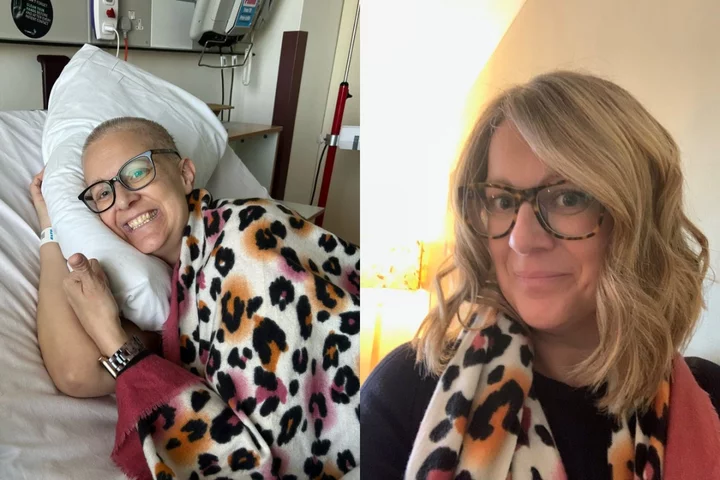
Mother diagnosed with cystic fibrosis, anorexia and incurable cancer says she ‘doesn’t feel afraid of dying any more’
A mother who was diagnosed with cystic fibrosis (CF) just days before her 30th birthday and later told she has myeloma – an incurable type of blood cancer – said she has “taught (herself) a whole new script for death” and, rather than feeling afraid, she feels “empowered” by what she has overcome. Ellie Allman, 42, who lives in Hadleigh, Suffolk, with her husband Steve, 44, a charity consultant, and son Harvey, 13, used to work as a specialist adviser for vulnerable young people but she had to retire, aged 35, after being diagnosed with CF aged 29. CF is an inherited condition that causes sticky mucus to build up in the lungs and digestive system, and while Ellie did not “feel anything initially” when she received her diagnosis, she “struggled mentally” later on and ended up developing anorexia, as she felt she had “no control over anything”. “I was off work, I was frustrated, I was angry, my body didn’t feel right CF-wise – I had no energy, I couldn’t do what I wanted,” Ellie told PA Real Life. “I was spending my days weighing everything I ate and just constantly doing the maths. “It seems ridiculous now, but it made so much sense at the time to that very determined person who was just clinging on to any form of normal life.” After becoming eligible to take Kaftrio in June 2021, a medication which significantly improves lung function, she noticed a vast improvement in her health. However, in less than a year, Ellie “randomly” became very unwell, and this led to the devastating news she has incurable cancer. After this, she underwent four months of chemotherapy alongside immunotherapy, followed by a stem cell transplant to replace the damaged blood cells with healthy ones in March 2023, and then a further two months of consolidation chemotherapy which included immunotherapy. She lost her hair, felt “exhausted” and anxious, and experienced pain “worse than labour contractions” from the “harvest of (her) stem cells” before the transplant, but she knew the pain would not last forever – and she said the support she has received from her husband, son, doctors, consultants and the charity, Ending Life’s Taboo, has been invaluable. She is now in remission and undergoing maintenance chemotherapy, and while she has experienced feelings of anger and resentment, she knows she can handle anything that her health throws at her. “I’ve taught myself a whole new script for death; I find it difficult to live with failing health, but I don’t feel afraid of dying any more,” she said. “We don’t get a choice, that’s just how it goes, but I think having the right people around you is so important. “I think it’s really natural when you’re young, or when you’re scared, to unintentionally isolate yourself or become withdrawn, and that has never ever worked for me. “I have to work hard not to lose myself within these diagnoses, and I have to remind myself that I’m still the person I was before my diagnosis.” During her childhood, Ellie developed whooping cough “in succession” – a bacterial infection of the lungs and breathing tubes – along with other chest infections and bouts of flu, but she was otherwise fit and healthy and used to run, swim, and was even a sports captain at school. She remembers certain periods of her life where she felt extremely fatigued and achy, but since her mother preferred alternative and natural medicines, Ellie rarely visited the doctor – and given she had “coughed (her) entire life”, she was “dismissive” of her symptoms. Later on, during her pregnancy, Ellie developed repeated chest infections, experienced difficulties with her speech, and could not clear her throat, but it was not until after she gave birth to her son Harvey, now 13, in 2010 that she underwent further testing. In February 2011, just days before her 30th birthday, it was confirmed she has cystic fibrosis – and, at first, she said she was “not willing to make room for CF in (her) life”. “You’ve lived your whole life not ill and then suddenly there’s this label,” Ellie said. “I didn’t feel anything initially, but I struggled with it later on, mentally.” According to the charity Cystic Fibrosis Trust, CF can be diagnosed during a new-born screening, which is carried out as part of the heel-prick test that all babies in the UK receive, but since this was only introduced nationally in 2007, this was not available for Ellie. Moreover, Ellie’s rare genotype made her CF even more difficult to diagnose. She underwent treatment in the form of intravenous (IV) antibiotics and physiotherapy sessions and noticed an improvement in her health, but when she started experiencing difficulties with her digestion – caused by a build-up of thick mucus – she started to feel “really frustrated with the world”. The side effects of the prescribed drugs also meant she could not conceive again – and while she is extremely grateful for her family, this had a “massive” impact on Ellie at the time. Ellie was then told she needed to take the medication Creon with food, which aids digestion, except for with fruits and vegetables, and this led to her developing anorexia in 2016. She said her head would “scream at her” but she could not “free (herself)” from negative thoughts that would body-shame her. “I had no control over anything, it was the perfect storm in a way; the perfect circumstances for me to use that as a control mechanism,” she said. Ellie became very weak after her “dramatic weight loss” of more than four-and-a-half stone, but after realising she needed to prioritise her health and time with her family, she underwent treatment and therapy to “reframe” her negative thoughts, so they were no longer a “dominant” force in her life. In June 2021, Ellie started taking Kaftrio, and she described it as “a miracle drug”, but approximately 11 months later, she began experiencing a “burning pain in (her) chest”. This led to the heart-breaking news in July 2022 that she has myeloma – a type of blood cancer, which is incurable – and the pain caused by treatments was unimaginable at times. She said: “Since Kaftrio thins the mucus, the high-dose chemo just ripped through the mucus in my throat, so I couldn’t swallow; the pain was insane. “My throat was blistered and ulcerated, so I couldn’t eat and I was put on to a feeding tube. “But I knew I had to get through it because if I stay in remission for two years, I could have a second transplant in future.” Ellie is now in remission and is undergoing maintenance chemotherapy, which she said “feels like a breeze in comparison”, and she is continuing to take Kaftrio, meaning the symptoms of her CF have “massively reduced” and she can enjoy the “simple things in life again”. She likes going on dog walks, meeting friends for a drink, and spending time with her “favourite people”, as that “makes everything else feel better” – and looking back now, she feels “empowered” that she has handled her CF, anorexia, cancer diagnosis, and treatments. While myeloma is incurable and Ellie has had some “existential thoughts”, she said processing what may happen in life has been “freeing” and she has always held on to hope. She has applied to become a magistrate and hopes another “miracle drug” like Kaftrio may become available during her lifetime to treat the cancer. She added: “Even in the most testing of times, every time I have found something positive to focus on or something to hope for and that has kept me going.” Ellie’s cancer is not linked to CF. To find out more information, visit: www.cysticfibrosis.org.uk/what-is-cystic-fibrosis/how-does-cystic-fibrosis-affect-the-body/cystic-fibrosis-complications/cancer Read More Dancer who has Tourette’s tics says Lewis Capaldi’s Glastonbury performance left her ‘speechless’ ‘Long Covid has taken away my ability to eat food or urinate - I don’t recognise myself anymore’ How to lower your blood sugar levels, as new research reveals heart disease link Groundbreaking cystic fibrosis drug made seven-year-old girl feel better ‘within hours’
2023-08-11 20:20

7 ways for parents and carers to ease back-to-school worries
School should be the best years of children’s lives – but, as the new term approaches, evidence suggests it’s actually the most worrying time for many kids. The children’s helpline Childline delivered 7,772 counselling sessions about school/education worries last year, with a big increase in calls in the run-up to the start of the new school year. “School is a huge part of a child’s life, so it’s important they feel happy and secure there,” says Childline director Shaun Friel. “We know some children can feel anxious and apprehensive about going back to school, particularly after spending a lot of time away from the classroom due to the summer break. “In fact, our Childline counsellors see a spike in the number of counselling sessions they deliver to children about school worries following the summer holiday season.” Friel says some children feel worried about making friends, getting lost, or the workload at a new school, while others may have concerns about returning to their current school due to friendship issues, fears about upcoming exams, or the recurrence of bullying. “However a child feels about returning to school, we want to remind them that these worries are normal and they aren’t alone,” he stresses. “If any child is feeling apprehensive about going back to school, our trained counsellors are here 24/7 over the phone and online.” As well as counselling, Friel says there are many things both parents and children can do to ease back-to-school anxieties. They include… 1. Writing feelings down Parents can get their child to write down everything they’re looking forward to at school, and everything they’re worried about. “Encourage them to show you the list so you can chat through their concerns, help them cope with their worries and also look at the positives,” suggests Friel. 2. Listening to their concerns If your child has concerns about going back to school, take time to listen to what they’re saying before you jump in to give advice or your opinion, Friel advises: “You could try repeating back what they’ve shared to check you’ve understood their feelings correctly – this will help them to feel really heard.” 3. Discussing practical solutions Once your child has shared any concerns or anxieties about going back to school, you could try talking through some practical solutions, suggest Friel. So, for example, if they’re worried about the amount of homework they’ll have, you could discuss how to break this down each evening and what they could do if they start to feel overwhelmed, like talking to their teacher or you. “You could start by asking them what they think might help them feel better about the situations that worry them,” says Friel. “This can encourage them to learn to think for themselves and feel in more control of the situation.” 4. Reminding them to take their time Remind your child it can take time to adjust to being back at school, and it’s okay if it doesn’t feel comfortable at first, says Friel. “Being back at school will mean a totally different routine, and it’s important to remember that this can take some getting used to,” he stresses. 5. Doing things they enjoy When kids are back at school, making time every day to do something they enjoy can really help to ease anxiety, says Friel. “Whether it’s time in their evening with friends, reading a book or hanging out with their siblings, it’s important to take time out,” he advises. 6. Talking to a trusted adult It’s important children are aware they can and should talk to a safe adult – perhaps a parent, carer, teacher, sibling over the age of 18 or a Childline counsellor – about anything. “No matter what the reason, if a young person is struggling ahead of going back to school, it’s vital they’re encouraged to talk to a safe adult about it,” stresses Friel. “Sharing their feelings with someone they trust will help them feel less alone with their worries, and that adult will be able to support them with this moving forward.” 7. Distracting themselves If children or young people make an effort to keep busy doing something they enjoy, such as playing football or listening to music, this could distract them from their worries, at least for a little while, says Friel. Staying connected with friends and family, whether that be online or in person, or doing some physical activity like going for a walk or taking part in a sport, can also be a good distraction technique. Young people can contact Childline, which is run by the NSPCC and supported by the People’s Postcode Lottery, on 0800 1111 or via 1-2-1 chat on Childline.org.uk Read More How to save money on your summer barbecue – as prices jump up from last year How to pick the best facial according to your age range What is the ‘carnivore diet’ trend and is it actually good for you?
2023-08-11 17:27
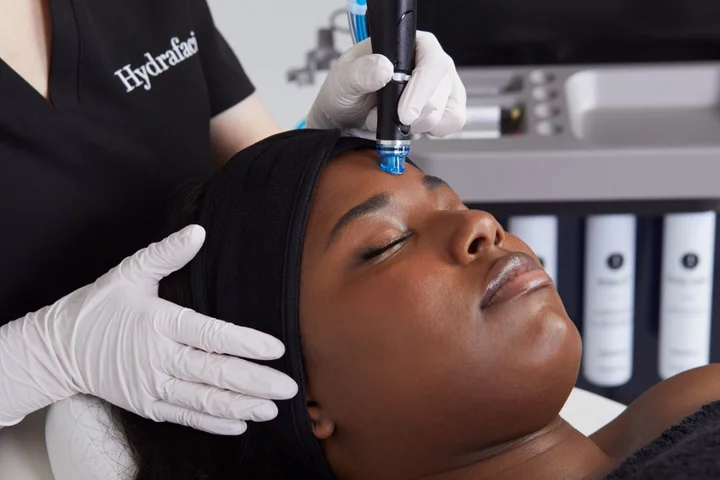
How to pick the best facial according to your age range
If you’re a dedicated skincare junkie, you might be thinking about how you can get that glow beyond your night-time skincare routine. Facials can be an appealing way of targeting any concerns you might have and giving your skin a bit of professional care. But they’re undoubtedly expensive, and generally more of an investment than buying a pot of moisturiser. Naturally, you want to spend your money as wisely as possible – and if you do have the extra funds for a facial, you don’t want to waste it. So, what’s the best type of facial to get for your age group? In your twenties “Facials and skincare choices in your twenties should be preventative; aiming to optimise your skin’s health and supercharging collagen and elastin levels,” says Dr Thuha Jabbar, aesthetic doctor and founder of Almas Dental. “Hydrafacials are a great, non-invasive skin boosting treatment that deep cleanse the skin, brighten and reduce fine lines. Chemical peels and other non-invasive facial treatments are also great to improve skin tone and keep breakouts at bay.” Dr Sophie Shotter is also a fan of Hydrafacials (which start from £125 depending on clinic and location – available in over 1,300 UK and Ireland providers). They provide a deep clean, followed by extracting any impurities then moisturising the skin. Shotter says they can “help to give the skin a deep clean, minimising the risk of breakouts. LED [light therapy facials] is also an excellent choice. Many facialists will combine techniques for best results.” Dr Radmila Lukian, dermatologist at the Lucia Clinic, recommends microdermabrasion for people in their twenties – a process where fine crystals and a vacuum are used to remove dead skin cells. She says it’s “a great treatment for brightening dull skin and reducing pigmentation. Perfect for young adults.” In your thirties When you hit your thirties, this is the time when Shotter recommends “starting to think about upping the ante” with your skincare. She recommends facials which incorporate microneedling – a process where small needles pierce the top layer of your skin. “We often start to notice the early signs of ageing, as collagen loss kicks in through our thirties, and these treatments can help to stimulate collagen production leading to significant improvements in skin texture,” Shotter says. Lukian recommends a facial that incorporates dermaplaning – where a scalpel removes hair and dead layers of skin – which she says can help “combat free radical damage, stimulate collagen and improve skin texture”. In your forties When you reach your 40s, Lukian suggests LED light therapy and laser skin resurfacing treatments, as they “become more relevant to target wrinkles, stimulate collagen and improve skin elasticity”. She adds: “Laser skin resurfacing uses targeted laser energy to promote collagen production – revealing healthier, younger-looking skin.” Kim Kardashian, 42, is a fan of laser facials, and often posts about her treatments on Instagram. Jabbar adds: “Your forties are a great time to try laser treatments, to reduce the visibility of wrinkles and boost the overall health and appearance of your skin. From laser skin resurfacing treatments to IPL [intense pulsed light] facials that reduce hyperpigmentation and sun spots, lasers are a versatile and non-invasive option which can restore a youthful glow to your skin.” In your fifties and beyond “In your fifties and beyond, keeping focused on collagen stimulation with similar approaches to our forties certainly helps a lot,” says Shotter. “But in our fifties, we often start to notice many more visible signs of ageing, including pigmentation and skin wrinkling (elastosis). Using deeper chemical peels or resurfacing laser techniques, which may carry a little downtime, but are worthwhile for the results.” For this age range, she says skin hydration “is also often a higher concern than in younger years”, so hydrating facials are an excellent choice too. While Hydrafacials are great in your twenties, they’re equally beneficial in your fifties and beyond – singer and actor Jennifer Lopez, 54, recently collaborated with the brand for her own ‘JLo Beauty Booster’ that can come as part of the treatment. Read More Charity boss speaks out over ‘traumatic’ encounter with royal aide Ukraine war’s heaviest fight rages in east - follow live What is the TikTok ‘carnivore diet’ trend and is it actually good for you? How to save money on your summer barbecue as prices soar Exercise and yoga can help improve lung function in adults with asthma – study
2023-08-11 16:51
